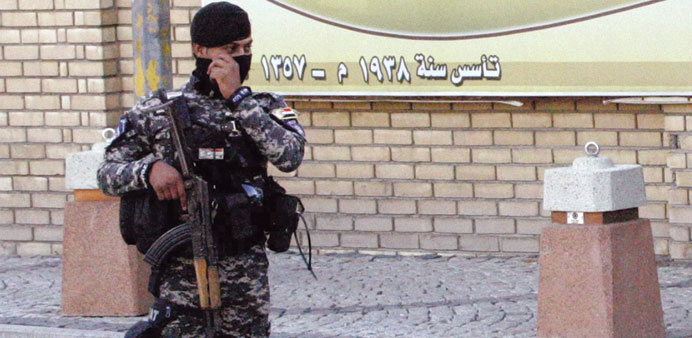Reuters/Baghdad
Iraqi police found 15 corpses yesterday, including three women shot in the head, in a bloody start to the Eid holiday, security sources said.
In other violence, two roadside bombs - one in Baghdad and another just southeast of the capital - killed a total of seven people, police and medics said.
This year’s Eid al-Fitr is filled with uncertainty and apprehension as Sunni insurgents set their sights on Baghdad and politicians struggle to form a power-sharing government capable of tackling them.
The insurgents seized swathes of the north last month, building on gains by comrades in the west of Iraq, and Iraq’s US-trained and funded army unravelled in the face of the lighting advance.
Shia militias now rival government forces in their ability to confront the group formerly known as the Islamic State of Iraq and the Levant.
Baghdad’s morgues are filling up once again with victims of sectarian slayings, kidnappings are on the rise and the bloodshed is forcing families to flee abroad or move to neighbourhoods where they feel less threatened.
Police found 15 corpses in different parts of the capital, security sources said. Among them were three women aged 25-30 who had been handcuffed and shot in the head execution-style in an industrial area just north of the Shia Sadr City district.
Critics say that Prime Minister Nuri al-Maliki, a Shia Muslim, has inflamed sectarian divisions by marginalising Sunnis instead of unifying Iraqis against the insurgents, now called the Islamic State.
Maliki, who has served in a caretaker capacity since the election in April, has said he would seek a third term despite calls from Sunnis, Kurds and even some Shias for him to make way for a less polarising figure.
US military and Iraqi security officials estimate the Islamic State has at least 3,000 fighters in Iraq, rising towards 20,000 when new recruits since last month’s advance are accounted for.
The Islamic State, an Al Qaeda spin-off, has declared a caliphate in parts of Iraq and Syria. It has been systematically stamping out any religious or cultural influences in the city of Mosul.
Signs are emerging that Iraqis who first welcomed the Islamic State are now growing impatient with its practices.
“I feel frustrated, desperate and sad as a result of the acts and practices done by those who are running the affairs of the city,” said Mosul shop owner Abu Mohamed.
“I was supporting them at the beginning but when I see what they are doing, I wish we could kick them out of our city.”
A television station run by the Mosul provincial governor reported that seven Islamic State militants were killed and five were kidnapped. It did not give details.

A policeman stands guard outside a Sunni mosque during prayers marking the beginning of Eid al-Fitr in central Baghdad yesterday.
